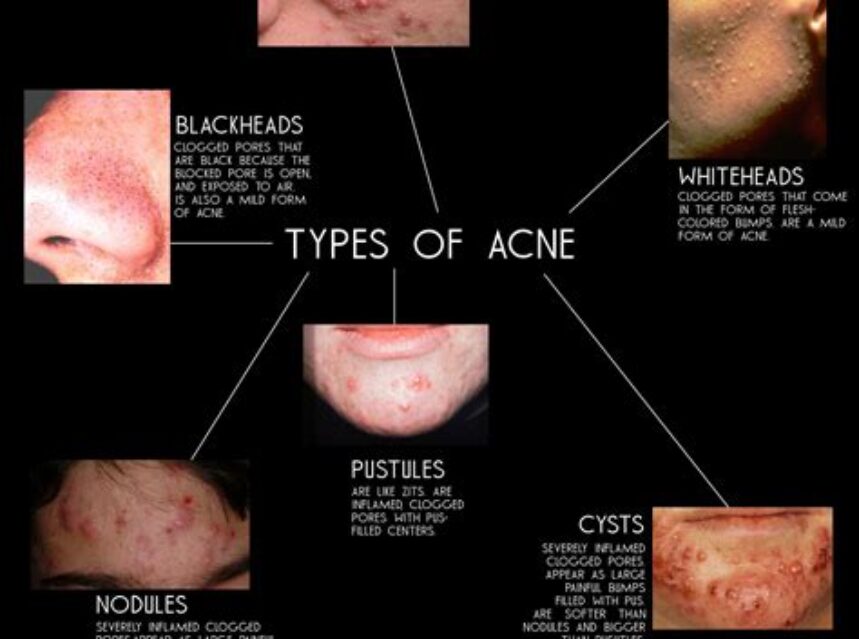Exploring Different Types of Acne: Causes, Treatments, and Prevention

Understanding the Different Types of Acne
Acne is a common skin condition that affects many people, especially during their teenage years. It occurs when hair follicles become clogged with oil and dead skin cells, leading to the formation of pimples, blackheads, and whiteheads. However, not all acne is the same. There are different types of acne, each with its own characteristics and treatment options.
One of the most common types of acne is acne vulgaris, which consists of non-inflammatory lesions (blackheads and whiteheads) as well as inflammatory lesions (papules, pustules, and nodules). Another type is acne rosacea, which is characterized by redness and swelling, usually on the face. Cystic acne is a severe form of acne that occurs when infections form deep within the skin, leading to large, painful cysts. It’s important to understand the differences between these types of acne in order to effectively treat them.
When it comes to treating acne, it’s crucial to consult a dermatologist who can provide personalized recommendations based on the specific type of acne you have. Treatment options may include topical creams, oral medications, and lifestyle changes. Additionally, it’s important to avoid picking or squeezing acne lesions, as this can lead to scarring and further inflammation.
By understanding the different types of acne and seeking appropriate treatment, you can effectively manage this common skin condition and prevent it from impacting your self-esteem and overall well-being.
Identifying the Causes of Acne Breakouts
Acne breakouts can be frustrating and embarrassing, but understanding the root causes can help in finding effective solutions. Hormonal imbalance plays a significant role in the development of acne. Fluctuations in hormone levels, especially during puberty, menstruation, and pregnancy, can lead to an increase in sebum production, which clogs pores and causes breakouts.
Another common cause of acne breakouts is genetics. If your parents or siblings have a history of acne, you’re more likely to experience it as well. Genetic factors can influence the size and activity of your oil glands, making you more susceptible to breakouts.
Diet can also impact acne development. Consuming high-glycemic foods, such as sugary snacks and processed carbohydrates, can trigger a spike in insulin levels, leading to increased oil production and clogged pores. Additionally, dairy products and certain fats have been linked to worsening acne symptoms in some individuals.
Lastly, stress is a major culprit in acne breakouts. When you’re stressed, your body produces more cortisol, which can stimulate oil production and result in clogged pores. Finding ways to manage stress, such as through meditation, exercise, or therapy, can help reduce the frequency and severity of breakouts.
Effective Treatments for Different Acne Varieties
Acne is a common skin condition that affects millions of people worldwide. It can manifest in various forms such as blackheads, whiteheads, papules, pustules, nodules, or cysts. Each type of acne requires a different approach when it comes to treatment.
For blackheads and whiteheads, over-the-counter topical treatments containing ingredients like benzoyl peroxide, salicylic acid, or retinoids can be effective in clearing the pores and preventing new breakouts. These treatments work by reducing inflammation and preventing clogged pores.
On the other hand, more severe forms of acne such as papules, pustules, nodules, and cysts may require prescription medications like oral antibiotics, oral contraceptives, or isotretinoin. These medications target the root causes of acne, including excess oil production, bacteria, and inflammation.
In addition to medication, dermatologists may also recommend procedures like chemical peels, laser therapy, or extraction to treat different acne varieties. These procedures can help to unclog pores, reduce inflammation, and improve overall skin texture.
Preventing Acne: Lifestyle Changes and Skincare Tips
Acne is a common skin condition that affects many people, especially during their teenage years. It can be frustrating and embarrassing, but the good news is that there are ways to prevent it from happening. Making lifestyle changes and following a good skincare routine can significantly reduce the likelihood of acne breakouts.
One of the most important lifestyle changes you can make to prevent acne is to maintain a healthy diet. Eating a balanced diet that includes plenty of fruits, vegetables, and whole grains can help keep your skin clear and healthy. Avoiding greasy and processed foods, as well as sugary drinks, can also make a big difference in preventing acne.
In addition to diet, regular exercise can also help prevent acne. Exercise helps regulate hormone levels and reduce stress, both of which are important factors in preventing acne breakouts. Just be sure to shower and cleanse your skin right after working out to remove sweat and bacteria that can clog pores and lead to breakouts.
Another important aspect of preventing acne is to establish a skincare routine that includes cleansing, exfoliating, and moisturizing. Using gentle, non-comedogenic products that are suitable for your skin type can help keep your skin clear and healthy. It’s also important to avoid touching or picking at your skin, as this can lead to inflammation and more breakouts.
Combating Acne Scars: Remedies and Procedures
Acne scars can be a source of frustration and embarrassment for many people who have struggled with acne. It’s important to understand that there are several remedies and procedures available to help combat the appearance of acne scars. One effective treatment option for combating acne scars is laser therapy, which works by stimulating collagen production and improving skin texture.
Another popular method for addressing acne scars is chemical peels, which involve the application of a chemical solution to the skin to remove the top layer and reveal smoother, more even skin underneath. This procedure can help reduce the appearance of acne scars and improve overall skin tone and texture.
In addition to professional treatments, there are also remedies that can be used at home to help reduce the appearance of acne scars. These can include topical treatments such as retinoids, which can help promote skin cell turnover and improve the appearance of scars over time.
It’s important to consult with a dermatologist to determine the best course of action for combating acne scars, as different types of scars may require different treatments. By exploring the various remedies and procedures available, it’s possible to reduce the appearance of acne scars and improve the overall appearance and health of the skin.
Frequently Asked Questions
What are the different types of acne?
The different types of acne include blackheads, whiteheads, papules, pustules, nodules, and cysts.
What are some common causes of acne breakouts?
Common causes of acne breakouts include hormonal changes, genetics, certain medications, and using the wrong skincare products.
What are some effective treatments for different acne varieties?
Effective treatments for acne include topical creams, oral medications, laser therapy, and chemical peels, depending on the type and severity of acne.
How can you prevent acne through lifestyle changes?
You can prevent acne through lifestyle changes by maintaining a healthy diet, managing stress, and practicing good skincare habits, such as regular cleansing and using non-comedogenic products.
What are some skincare tips for preventing acne?
Skincare tips for preventing acne include using gentle cleansers, exfoliating regularly, and using non-comedogenic moisturizers and sunscreen.
What are some remedies for combating acne scars?
Remedies for combating acne scars include topical treatments like retinoids and vitamin C serums, as well as procedures like microneedling, chemical peels, and laser therapy.
What are some lifestyle changes to prevent acne?
Making lifestyle changes such as managing stress, maintaining a healthy diet, and practicing good skincare habits can help prevent acne.


